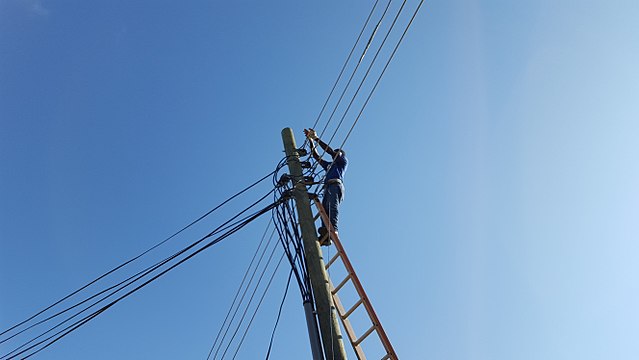
How to Become a Self-Employed Electrician

Tradespeople are in high demand nowadays. This demand is doubly true for electricians, including those who become a self-employed electrician.
And self-employed electricians are also earning pretty massive profits for their knowledge, skills, and experience.
Those of you who have done a little research will know that blue-collar work is starting to pay better than some white-collar work!
More specifically, investing in yourself to become an electrician can pay greater dividends than many different academic or social science college degrees.
However, these hefty paychecks don’t come without putting in the effort. There are some steps that you need to take to get to the point where you can practice as a full-fledged self-employed master electrician.
So in this guide, you’re going to learn all of the steps required to take you from the beginning stages of electrician work to success.
Let’s dive into freelancing for electricians.
Learn how to start a freelance business in your field:
Freelance Mechanic | Freelance Engineer | Freelance Accountant | Freelance Barber | Freelance Hair Stylist | Freelance Software Developer | Freelance Content Strategist | Freelance Physical Therapist | Freelance Bartender | Freelance Chef | Freelance Medical Assistant | Freelance CycleBar Instructor | Freelance CrossFit Coach | Freelance Content Writer | Freelance Piano Tutor | Freelance Waxing | Freelance Audio Editor | Freelance Data Analyst | Freelance Photographer | Freelance Tutor | Freelance Videographer | Freelance Welder | Freelance Teacher | Freelance Video Editor | Freelance Real Estate Agent | Freelance UX Designer | Freelance Copy Editor | Freelance Administrative Assistant | Freelance Social Media Manager | Freelance Carpenter | Freelance DJ | Freelance Illustrator | Freelance Copywriter | Freelance Personal Trainer | Freelance Grant Writer
Step 1: Become an Electrician
In the United States, there are specific benchmarks you need to meet before you can go out on your own to be self-employed in the field.
These benchmarks are primarily governed state by state. But as a general rule, every state is going to require a certain amount of on-the-job experience in the field.
This experience is usually gained by obtaining a paid electrician apprenticeship. With on-the-job training, you’ll learn alongside experienced electricians while still earning an hourly wage.
The following are steps you can take to become an electrician:
1. Get a High School Diploma or Equivalent Degree
The minimum level of education required to become an electrician or electrical contractor is a high school diploma or an equivalent degree, such as a General Education Diploma.
For more state-specific information about obtaining your GED, check out this page and select your state/area.
That’ll help you determine how to get your GED based on your geographic location.
2. Get Specialized Training
You can get specialized training to be an electrician in several different ways.
Some of these include:
- Joining the military
- Enrolling in a trade or vocational school
- Taking college classes in electrical technology (or a related degree)
- Going right to an apprenticeship
But here’s the crucial part:
No matter which direction you choose, you’ll still need to find a way to become an electrician’s apprentice.
This apprenticeship is the only path to becoming a full-fledged electrician and, eventually, working your way up to being a self-employed electrician/business owner.
Unlike many other career paths, being an electrician doesn’t necessarily require going to college or taking classes.
It’s perfectly feasible to enter the workforce as an apprentice and get right to the task of studying electrical work on the job.
With that being said, getting some kind of certificate or degree in the field before becoming an apprentice can be extremely helpful.
Prior education or certification can help you to get your foot in the door when applying for apprenticeships with electrician companies if you don’t have years of experience under your belt.
Generally speaking, electrician apprenticeships are highly competitive. So any advantage that you can give yourself is a bonus.
For example, you could attend college classes to get a bachelor’s degree in electrical engineering (or a related vocational/technical degree).
This degree can be beneficial in the sense that it can provide you with some helpful classroom time that’ll help you to understand the national electrical code, the theory of electrical installations, a general overview of what a service technician needs to know, etc.
Note: Once you become an apprentice, you’ll have some class-time that you’ll need to take anyway.
3. Apply For An Apprenticeship
You can apply as an apprentice through a trade school, union, or even through a non-union organization. Read this post from Indeed.com to learn a bit more about how to go about this process.
Mad Electrician also published an excellent how-to video tutorial on this topic, which you can view here.
4. Complete Your Apprenticeship
In different states, the requirements for completing your apprenticeship will vary.
For example, In Missouri, there are four different ways in which you can qualify for an electrician’s license, and two of them involve an apprenticeship.
One path you can take is to complete a five-year union or non-union apprenticeship program, which includes 500 hours of classroom time and 8,000 hours of hands-on work experience.
Another path is to work with a master electrician in an apprentice role for six years to get 12,000 hours of work experience.
The point here is to figure out what it will take to complete your apprenticeship and then make a plan for getting it done.
Once you get done with your apprenticeship, you’ll graduate to the level of journeyman electrician.
5. Get Licensed Or Certified

Once again, getting the proper licensing and/or certification will vary by state. It may seem tedious after everything else you’ve gone through in your electrician’s journey, but these certifications protect everyone.
This is an incredibly important step that you’ll need to take to become a full-fledged licensed electrician.
Here’s a good resource to help you figure out what each state requires to get licensed as an electrician.
So now you have your certifications. Surely you’re ready to update your LinkedIn to show that you’re a self-employed electrician now, right?
Not quite.
The truth of the matter is that you need to become a master electrician to start your own small business as a tradesman in this field.
6. Become A Master Electrician
To go out on your own and be a self-employed electrician, you’re going to need to advance beyond the journeyman level and become a master.
The requirements for this vary from state to state. But in most states, you’ll need to:
- Work as a journeyman for a specific number of hours underneath a master
- Pass written and practical exams covering electrical competency
- Pass a background check
For more information about how to become a master electrician, check out this post by Indeed.com.
7. Start Your Electrician’s Business
Now that you’re a licensed electrician with a ‘master electrician’ job title, you’ll have the ability to set out on your self-employed journey.
Congratulations!
Now you have the power to market your business to homeowners and business owners who may need to hire you as an electrical service provider, either for new construction, renovations, repairs, and more.
This is the beginning of a new phase of your life, and you should be extremely excited about it.
However, the journey isn’t over yet.
Subscribe To SelfGood
Get up to date perks and Gigworker news. Easy. Simply. SelfGood. Subscribe.
Step 2: Start Your Self-Employed Electrician Business
Building your own business, regardless of whether you’re in New York, California, or anywhere in-between, isn’t necessarily a picnic!
Here are some vital steps that you’ll need to take along the way.
1. Obtain All Necessary Business Documentation, Licenses, etc.
Once again, this will vary by state. And business licensing will also vary by city/town/county.
In addition to your electrician’s license, you’ll also need to file tax paperwork with the state, get a local business license, etc.
Yes, you’ve graduated from the hurdles of becoming an electrician to all the fun of taxes.
Thankfully, the SBA (the U.S. Small Business Administration, found at SBA.gov) has some awesome resources on their website to help new business owners just like you.
These resources are excellent for anyone planning to jump into part-time or full-time work, either with their sole trader or work from home business.
You can find their complete small business guide here.
Follow those steps, and you should be good to go.
2. Make a Tax Plan
Filing taxes will require more than just turning in a tax return at the end of the year.
As a self-employed electrician, you’ll also need to pay self-employment taxes in most states, as well as income taxes and taxes on your business.
And trust us, this works better if you start on the right foot with a detailed, accurate tax plan to help you withhold your taxes and stay on track.
To learn more about your tax responsibilities as a self-employed professional, check out the Self-Employed Individuals Tax Center on the IRS website.
3. Source Your Own Electrician’s Insurance
Finding public liability insurance for your self-employed electrician’s business is crucial.
This precaution is non-negotiable.
Being an electrician is a dangerous trade. And it’s imperative to properly insure yourself.
This guide, published on Fitsmallbusiness.com, does a pretty good job of covering what you’ll need in terms of electrician insurance.
It’s a deep dive!
But the key is to understand the basics enough to allow you to find a local insurance provider you trust to help you get the coverage you need.
What About Health Insurance?
Once you leap to become self-employed, you’ll also need to think about sourcing your benefits as well.
Gig workers and self-employed business owners sometimes struggle with this, because they’re often forgotten by insurance companies who focus almost primarily on employees and big businesses.
This is exactly what Selfgood does! We provide great benefits packages for self-employed tradesmen just like you, sometimes for less than $1 per day!
Get healthcare benefits, student loan help, legal help, and more.
It’s awesome.
4. Ensure That You Keep Your Licenses and Permits Up to Date
Once you get licensed as a small business owner and electrician, keeping your licenses and certifications up to date will be essential.
This will require you to make sure to renew licenses as they approach expiration and to just in-general stay on top of the ‘paperwork’ aspect of your business.
It’s essential not to let this go. Yes, it’s kind of a pain. But as an electrician, it’s crucial for you to maintain your licensing and that you keep it up to date.
Operating as an electrician without the proper license and certifications can open you up to some real legal troubles. So keep it all updated!
5. Make Sure That You Have All Of The Tools And Equipment You’ll Need To Run Your Business

You’re going to need some tools and electrical equipment to make your business successful.
By this point, you’ll have already completed an apprenticeship and worked for a certain number of years as a journeyman. So you likely know what’s required to make an electrician’s business function.
You’ll just need to go ahead and purchase any essential tools that you didn’t already own.
6. Make A Plan To Market Your Business And Build Your Client Base
Marketing your business will be another art form all of its own.
Unfortunately, a lot of electricians and tradespeople struggle with this part of starting their businesses.
Unless you already have your foot in the door, finding new clients in your area can be a daunting challenge.
You may also want to consider:
- Joining local business networking and referral groups
- Joining the local Chamber of Commerce
- Printing out business cards and developing your brand
- Starting social media pages to interact with others in your local community
7. Execute Your Plan and Begin the Journey
Starting your own business as a self-employed electrician is an amazing idea.
Electrician salaries are fantastic, and the job itself isn’t too taxing or demanding if you have a passion for the work.
You just need to go through the proper channels to get yourself to the place where you’re ready to take the leap and branch out on your own.
But remember: nothing worthwhile is ever easy.
It’ll require determination, persistence, and perseverance to get through the years of apprenticeship required to gain the experience and licensing needed to become a self-employed electrician.
But here’s the thing:
Where there’s a will, there’s a way.
If you believe in yourself, there’s nothing that you can’t accomplish.
Your dreams are worth the work.
So get out there and make it happen!
Conclusion
We hope that you’ve found this guide helpful.
We also hope that you’ll remember Selfgood when the time comes to source a replacement for your current ’employer-supplied’ insurance plan.
Selfgood loves providing benefits for gig workers, freelancers, and self-employed tradesmen! Check us out and obtain all the benefits you need to make self-employment even more enjoyable.





